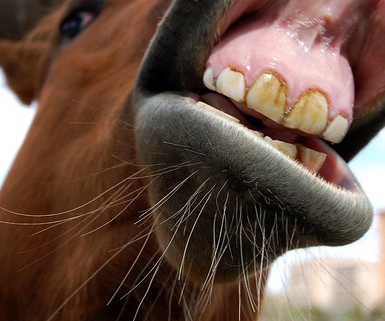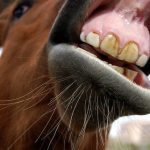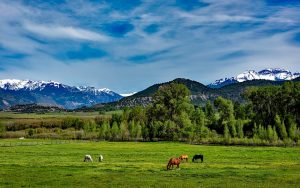
You’ve gone out to the barn to investigate a truly awful smell and you notice that not only is the smell coming from your horse, but he has an exceptionally snotty nose on one side. What could it mean?
Older horses (more than 15 years of age and up to over 30) quite commonly can get a snotty nose from an abscessed upper tooth root. How does an infected tooth root cause a snotty nose? In the horse, over half of their pre-molars and molars (also called the “cheek teeth”) have tooth roots that are directly below the maxillary sinuses. If any of these teeth have periodontal disease, or abnormal confirmation, they are at risk for an abscessed tooth root.
These types of abscess will commonly cause what is known as a sinusitis, or inflammation/infection of a sinus. The most common sign of this type of sinusitis is a TERRIBLE snotty nose, usually from one side and with a TERRIBLE odor. You may ask yourself, “Self, how will I know what exactly this terrible odor smells like?” Good question. You will recognize the odor by the fact that the last thing that you want your horse to do at that time is to come within 10 feet of touching you with their snotty nose, it smells so bad. Trust us, you won’t have to wonder if it’s the terrible odor we are referring to!
Most of these types of tooth root infections are solved by removing the offending tooth. A tooth extraction will usually require radiographs (the offending tooth is not always evident on oral examination) and sedation, along with regional nerve blocks for anesthesia. Specialized extractors complete the list of required elements to perform most extractions. Horses will start to have a dramatic improvement in a very short period of time following removal, along with some antibiotics to help finish off the infection.
Remember, regular dental checkups and exams from your veterinarian are an important part of your horses’ overall health, and an important part of any preventative health plan. Horses typically need regular dental floats either yearly or every other year, depending on their age and dental confirmation. Give us a call, or send us an email to set up a dental checkup for your equine companion!
*Image courtesy Tania_Cataldo on Flickr
VITAL SIGNS
Adult Horse (at rest)
Temperature: 98.0-101.0
Heart Rate: 32-40 beats/min
Resp Rate: 6-16 breaths/min
Cap Refill: 1-2 seconds
Gut sounds: Always Present, one every 3-5 seconds. Listen to both sides, upper and lower quadrants.








No comment yet, add your voice below!